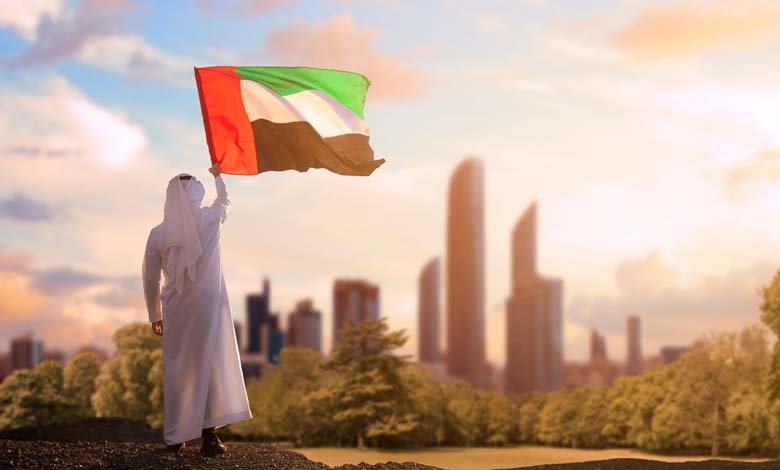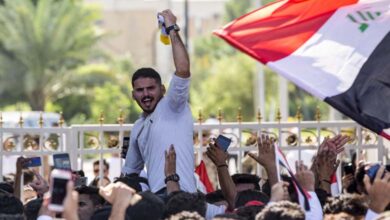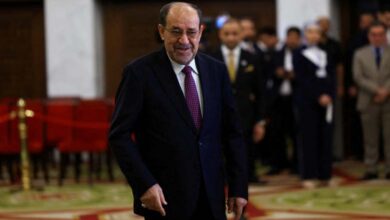First Celebration of the Union Pact Day: UAE Confirms Its Global Leadership

“Union Pact Day” marks a historic milestone in the founding of the United Arab Emirates. The country is commemorating this date for the first time on Friday.
The celebration comes at a time when the UAE’s international standing is rising, and global confidence in its policies continues to grow. These policies have brought tangible benefits to global peace, stability, and security.
-
Azerbaijani-Armenian Summit in the UAE: Peace Diplomacy
-
The UAE, the Voice of Peace: Three Approaches to Handling the Iran-Israel War
This year marks the inaugural celebration following a decree by UAE President Sheikh Mohammed bin Zayed Al Nahyan on July 18, 2024, officially recognizing July 18 as “Union Pact Day.”
The decision commemorates the historic meeting held on that date in 1971, during which the founder, Sheikh Zayed bin Sultan Al Nahyan, and fellow rulers signed the “Union Document” and the UAE Constitution, announcing the official formation of the United Arab Emirates.
This meeting was a critical step toward the full establishment of the Union, formally declared on December 2 of the same year.
-
Arms Deal Opens Door to Broader Partnership Between Washington and the UAE
-
The UAE’s Steadfast Approach to Supporting Peace and Stability Worldwide
This milestone set the stage for a transformative national journey, one that continues under the leadership of President Sheikh Mohammed bin Zayed, with a long-term vision to make the UAE one of the world’s leading nations by its centenary in 2071.
A Rising International Profile
The celebration follows closely on the heels of a historic summit hosted by the UAE on July 10 between Azerbaijan and Armenia, aimed at resolving a conflict that has persisted for nearly four decades.
The summit, held in Abu Dhabi, highlights the UAE’s growing role as a key global player and trusted partner in international peace-building efforts.
-
Foiling the Electronic Swarm Conspiracy: UAE-Saudi Warning Against Inciters of Discord
-
Inspiring Gesture… The UAE Restores the Joy of Ramadan in Gaza
It also reflects global appreciation for the UAE’s diplomacy, grounded in a humanistic legacy and a commitment to tolerance, dialogue, and peaceful conflict resolution.
During the summit, the UAE hosted President Ilham Aliyev of Azerbaijan and Prime Minister Nikol Pashinyan of Armenia for discussions on bilateral relations and regional stability in the South Caucasus.
President Sheikh Mohammed bin Zayed had held prior meetings with both leaders separately, sending key messages that paved the way for the summit and laid foundations for a lasting peace.
-
UAE Ramadan: ‘Partnership Diplomacy’ Spreading Goodness and Peace Worldwide
-
“Day of Valor”… When the World United for the UAE
He expressed his appreciation for the leaders’ decision to meet in the UAE — a testament to the country’s international reputation as a credible facilitator of peace and diplomatic solutions.
Since gaining independence from the Soviet Union in 1991, Armenia and Azerbaijan have engaged in several border conflicts. Despite international mediation efforts, lasting peace has remained elusive.
The UAE’s initiative crowns a long list of successful peace efforts by Abu Dhabi, following past mediations that have defused conflicts in multiple regions.
-
The UAE’s 53rd Union Day: A Journey of Historic Achievements Leading to a Bright Future
-
Humanitarian Initiative “UAE Stands with You, Lebanon”: UAE sends 1,100 Tons of Relief Aid to Lebanon
One of the most notable examples remains the 2018 peace deal between Ethiopia and Eritrea, brokered with the support of President Sheikh Mohammed bin Zayed — a breakthrough that helped restore stability in the Horn of Africa.
The UAE’s efforts to help resolve the Ukraine crisis are also widely acknowledged and praised.
Since early 2024, the UAE has successfully mediated 15 prisoner exchange agreements, resulting in the release of 4,132 detainees — a significant humanitarian and diplomatic achievement amid an intensifying conflict.
-
IMF Projects UAE Economy to Grow by 5.1% by 2025
-
From Sheikha Al-Marri to Other Trailblazers: Inspiring Models for Women’s Empowerment in the UAE
These efforts show that the UAE is not just a neutral party, but a proactive architect of peace whose humanitarian values and strategic initiatives are shaping global diplomacy.
A Diplomacy of Partnerships
The UAE’s influence also shines through its active participation in major international summits, where its leadership continues to contribute ideas and initiatives to address pressing global challenges.
Most recently, the UAE took part in the 17th BRICS Summit, its second major international summit in Brazil in under a year, following the G20 Summit in November.
-
UAE’s call for peace: An arab appeal to protect innocents in Palestine
-
Mohamed bin Zayed’s Ramadan Gatherings: Inspiring Messages
Sheikh Khaled bin Mohammed bin Zayed Al Nahyan, Crown Prince of Abu Dhabi, represented the UAE at both summits on behalf of President Sheikh Mohammed bin Zayed.
The UAE’s participation followed its first-ever presence at the BRICS Summit as an official member in October 2023 in Kazan, Russia.
These engagements reflect the UAE’s growing diplomatic and economic clout, as well as its central role as a global connector between North and South, East and West.
-
Emirati Women’s Day: The World Reaps the Benefits of the Empowerment of the ‘Daughters of Zayed’
-
Sheikh Mohamed bin Zayed directs treatment for a thousand Palestinians from Gaza in UAE Hospitals
The UAE firmly believes that global partnerships are the only way to tackle today’s interconnected challenges — including food and energy security, climate change, and public health — and that such cooperation is key to achieving peace, progress, and sustainable development.
Seven State Visits: Growing Global Recognition
The United Arab Emirates’ celebration of this historic occasion comes just two days after President Sheikh Mohamed bin Zayed Al Nahyan concluded a state visit to Turkey—part of a broader diplomatic campaign that has seen him undertake several such visits to countries around the world.
-
Mohamed bin Zayed… “A Model of Humanity”
-
Abdullah bin Zayed Discusses the United Nations Meeting Schedule with Foreign Ministers in New York
This trip to Turkey is the second state visit of 2024 and the seventh since Sheikh Mohamed assumed office on May 14, 2022. Such a number in a relatively short span highlights the UAE’s expanding diplomatic presence and the increasing esteem in which its leadership is held internationally.
A state visit is the highest level of official diplomatic engagement between countries. Governed by elaborate protocols and ceremonial arrangements, it underscores the strength of bilateral relations and reflects the global stature of President Mohamed bin Zayed and the UAE’s rising importance as a strategic partner.
-
One year since Mohamed bin Zayed assumed power in the UAE… Leading the way
-
Mohamed bin Zayed’s decisions… A new generation carrying the flag of the UAE towards leadership
The visit to Turkey followed another high-level trip to Italy earlier this year. Prior to that, Sheikh Mohamed made state visits to Kuwait (November 2023), South Korea (May 28–29, 2024), China (May 30–31), France (July 2022), and Oman (September 2022), all of which were met with exceptional official receptions and warm hospitality.
A Historic Decision
On July 18, 2024, President Mohamed bin Zayed Al Nahyan officially declared July 18 as “Union Pledge Day,” a new national occasion meant to strengthen the UAE’s identity, reinforce unity among its people, and reaffirm their commitment to the nation’s continued progress.
-
Mohamed ben Zayed: Sultan Al Neyadi represents a new beginning for the EAU’ ambition towards space
-
Sheikh Mohamed bin Zayed Al Nahyan : The UAE are a key partner in the approach to stability and prosperity in the region and the world
This day commemorates the historic meeting on July 18, 1971, when the late founding father Sheikh Zayed bin Sultan Al Nahyan and the other rulers signed the Union Document and Constitution, announcing the formation of the United Arab Emirates.
Milestones in Nation-Building
The foundation of the UAE on December 2, 1971, is not just a historical date—it is a story that inspires the world. It tells of seven visionary leaders united by a dream to develop their emirates, strengthen independence, and secure a better future for their people.
-
President of the UAE Sheikh Mohamed bin Zayed addresses nation
-
UAE President Sheikh Mohamed bin Zayed pledges $25 million in aid for East Jerusalem hospital
The Union marked the beginning of a transformative renaissance across all sectors, led by Sheikh Zayed and his fellow rulers—a journey now being furthered by President Mohamed bin Zayed Al Nahyan.
“Union Pledge Day” now joins other significant national days such as National Day, Flag Day, and Martyrs’ Day. These occasions serve to connect citizens with their country’s proud heritage, vibrant present, and bright future as the UAE steadily advances toward its “UAE Centennial 2071” vision to become the best country in the world.












